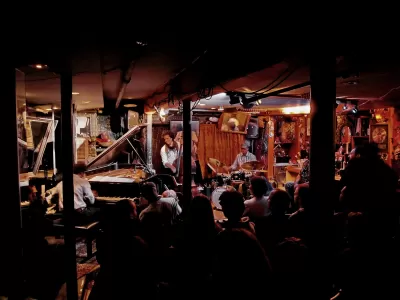A new real estate investment fund wants to help music venue owners buy their properties and stay in business as the pandemic and market forces decimate their earnings.

When the pandemic shut down live entertainment, music venues saw their revenues plummet as much as 90%, with many struggling to keep paying their bills. To help venues stay afloat, Dayna Frank, owner of First Avenue Music Hall in Minneapolis, worked with Grubb Properties CEO Clay Grubb to create "the Live Venue Recovery Fund, a pioneering program that provides eligible independent music operators with a 3 – 5 year roadmap toward purchasing their own venues." Rebecca Greenwald reports on the fund's efforts for Next City.
As renters, Frank believes, many venue owners are extremely vulnerable to "a growing affordability crisis and the whims of opportunistic landlords, and the looming threat of Live Nation’s growing influence and consolidation of the industry." The recovery fund aims to shift the balance of power and give venue operators a path to ownership. "Designed around an impact fund real estate model, the Live Venue Recovery Fund caps Grubb’s rate of return at 12%, after which any remaining returns are donated to the National Independent Venue Foundation, a nonprofit related to the National Independent Venue Association (NIVA), a trade association that was formed at the start of the pandemic."
"Rather than looking at the Live Venue Recovery Fund as an aggressive acquisition program," writes Greenwald, "Frank sees this as a resource and another option that venues have available to them as they navigate a challenging external environment."
FULL STORY: Will This Impact Fund Save America’s Music Venues?

Alabama: Trump Terminates Settlements for Black Communities Harmed By Raw Sewage
Trump deemed the landmark civil rights agreement “illegal DEI and environmental justice policy.”

Planetizen Federal Action Tracker
A weekly monitor of how Trump’s orders and actions are impacting planners and planning in America.

Why Should We Subsidize Public Transportation?
Many public transit agencies face financial stress due to rising costs, declining fare revenue, and declining subsidies. Transit advocates must provide a strong business case for increasing public transit funding.

Understanding Road Diets
An explainer from Momentum highlights the advantages of reducing vehicle lanes in favor of more bike, transit, and pedestrian infrastructure.

New California Law Regulates Warehouse Pollution
A new law tightens building and emissions regulations for large distribution warehouses to mitigate air pollution and traffic in surrounding communities.

Phoenix Announces Opening Date for Light Rail Extension
The South Central extension will connect South Phoenix to downtown and other major hubs starting on June 7.
Urban Design for Planners 1: Software Tools
This six-course series explores essential urban design concepts using open source software and equips planners with the tools they need to participate fully in the urban design process.
Planning for Universal Design
Learn the tools for implementing Universal Design in planning regulations.
Caltrans
Smith Gee Studio
Institute for Housing and Urban Development Studies (IHS)
City of Grandview
Harvard GSD Executive Education
Toledo-Lucas County Plan Commissions
Salt Lake City
NYU Wagner Graduate School of Public Service





























